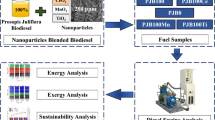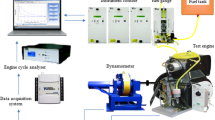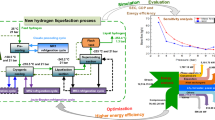Abstract
Nowadays, engines design technology tends toward less fuel consumption and emission besides higher efficiency. Hydrogen as a clean fuel has been a point of interest for long time, but in recent years due to fossil fuel increasing prices and stringent environmental laws, more considerations have been made. In addition to the challenges of producing and storing hydrogen as a fuel for internal combustion engines, the engine performance should be independently evaluated. Simultaneous investigation of energy and exergy brings better analysis of internal combustion engines performance and helps researchers to propose more efficient ways for engines development. In this work, energy and exergy analysis of a hydrogen-fueled homogeneous charge compression ignition engine has been done to investigate the effects of engine input parameters on its performance. Considered input parameters are engine speed, inlet pressure and temperature, equivalence ratio and exhaust gas recirculation. To achieve this goal, a single-zone thermodynamic model considering detailed chemical kinetics has been employed which is able to estimate engine performance qualitatively. Results show inlet valve closing (IVC) pressure and equivalence ratio have the greatest impact on irreversibility and exergy terms, while engine speed is the least effective parameter on irreversibility production. Both power and irreversibility increase by IVC pressure enhancement, and furthermore IVC temperature increase reduces charge chemical exergy by engine volumetric efficiency decrease.













Similar content being viewed by others
Abbreviations
- 0D:
-
Zero dimensional
- aBDC:
-
After bottom dead center
- aTDC:
-
After top dead center
- bBDC:
-
Before bottom dead center
- CI:
-
Compression ignition
- CFD:
-
Computational fluid dynamics
- CAD:
-
Crank angle degree
- EGR:
-
Exhaust gas recirculation
- EVO:
-
Exhaust valve opening
- HCCI:
-
Homogeneous charge compression ignition
- HC:
-
Hydrocarbon
- IMEP:
-
Indicated mean effective pressure
- IVC:
-
Inlet valve closing
- NOx :
-
Nitrogen oxides
- SI:
-
Spark ignition
- SOC:
-
Start of combustion
- TKM:
-
Thermo-kinetic model
- VVT:
-
Variable valve timing
- A :
-
Availability
- Ex:
-
Exergy
- H :
-
Enthalpy
- HR:
-
Humidity ratio
- I :
-
Irreversibility
- K :
-
Specific heat capacities ratio
- N :
-
Engine speed
- P :
-
Pressure, power
- \(r_{\text{c}}\) :
-
Real compression ratio
- S :
-
Entropy
- T :
-
Temperature
- V :
-
Volume
- Y :
-
Mole/mass fraction
- \(\theta\) :
-
Crank angle
- \(\mu\) :
-
Chemical potential
- \(\emptyset\) :
-
Equivalence ratio
- 0:
-
Dead state
- C:
-
Chemical, clearance
- gen:
-
Generated
- Q:
-
Heat transfer
- tm:
-
Thermo-mechanical
- W:
-
Work
References
ISO. Basic considerations for the safety of hydrogen systems, 2001. Technical Report ISO/PDTR 15916.
Hairuddin AA, Yusaf T, Wandel AP. A review of hydrogen and natural gas addition in diesel HCCI engines. Renew Sustain Energy Rev. 2014;32:739–61.
Ibrahim MM, Ramesh A. Investigations on the effects of intake temperature and charge dilution in a hydrogen fueled HCCI engine. Int J Hydrog Energy. 2014;39(26):14097–108.
Fathi M, Jahanian O, Shahbakhti M. Modeling and controller design architecture for cycle-by-cycle combustion control of homogeneous charge compression ignition (HCCI) engines—a comprehensive review. Energy Convers Manag. 2017;139:1–19.
Ezoji H, Shafaghat R, Jahanian O. Numerical simulation of dimethyl ether/natural gas blend fuel HCCI combustion to investigate the effects of operational parameters on combustion and emissions. J Therm Anal Calorim. 2018. https://doi.org/10.1007/s10973-018-7271-2.
Pielecha I, Borowski P, Czajka J, Wisłocki K, Kaźmierowski J. Combustion process shaping by use of different strategies of multiple fuel injection in a CI model engine. J Therm Anal Calorim. 2015;119(1):695–703.
Sroka ZJ. Some aspects of thermal load and operating indexes after downsizing for internal combustion engine. J Therm Anal Calorim. 2011;110(1):51–8.
Nouri M, Namar MM, Jahanian O. Analysis of a developed Brayton cycled CHP system using ORC and CAES based on first and second law of thermodynamics. J Therm Anal Calorim. 2018. https://doi.org/10.1007/s10973-018-7316-6.
Doğan B, Erol D, Yaman H, Kodanli E. The effect of ethanol-gasoline blends on performance and exhaust emissions of a spark ignition engine through exergy analysis. Appl Therm Eng. 2017;120:433–43.
Jafaryar M, Sheikholeslami M, Li Z, Moradi R. Nanofluid turbulent flow in a pipe under the effect of twisted tape with alternate axis. J Therm Anal Calorim. 2018;1:1–19.
Saravanakumar R, Selladurai V. Exergy analysis of a domestic refrigerator using eco-friendly R290/R600a refrigerant mixture as an alternative to R134a. J Therm Anal Calorim. 2014;115(1):933–40.
Pandey A, Tyagi V, Park S, Tyagi S. Comparative experimental study of solar cookers using exergy analysis. J Therm Anal Calorim. 2011;109(1):425–31.
Marquardt M. Hydrogen fuel cells. North Mankato: Abdo Publishing; 2017.
Boretti A, Osman A, Aris I. Direct injection of hydrogen, oxygen and water in a novel two stroke engine. Int J Hydrog Energy. 2011;36(16):10100–6.
Erren RA, Hastings-Campbell W. Hydrogen from off-peak power. Chem Trade J. 1933;92:238–9.
Bengtsson J, Gafvert M, Strandh P, editors. Modeling of HCCI engine combustion for control analysis. In: 43rd IEEE conference on decision and control, 2004, IEEE. CDC;2004.
Lee K, Kim Y, Byun C, Lee J. Feasibility of compression ignition for hydrogen fueled engine with neat hydrogen-air pre-mixture by using high compression. Int J Hydrog Energy. 2013;38(1):255–64.
Pochet M, Truedsson I, Foucher F, Jeanmart H, Contino F. Ammonia-hydrogen blends in homogeneous-charge compression-ignition engine. In: SAE technical paper 2017. Report no.: 0148-7191.
Rakopoulos C, Kyritsis D. Hydrogen enrichment effects on the second law analysis of natural and landfill gas combustion in engine cylinders. Int J Hydrog Energy. 2006;31(10):1384–93.
Guo H, Neill WS. The effect of hydrogen addition on combustion and emission characteristics of an n-heptane fuelled HCCI engine. Int J Hydrog Energy. 2013;38(26):11429–37.
Nieminen J, Dincer I. Comparative exergy analyses of gasoline and hydrogen fuelled ICEs. Int J Hydrog Energy. 2010;35(10):5124–32.
Amjad A, Saray RK, Mahmoudi S, Rahimi A. Availability analysis of n-heptane and natural gas blends combustion in HCCI engines. Energy. 2011;36(12):6900–9.
Bika AS, Franklin L, Acevedo H, Kittelson D. Hydrogen fueled homogeneous charge compression ignition engine. In: SAE technical paper 2011. Report no.: 0148-7191.
Fatehi GR, Khalilarya S, Ebrahimi R. Energy and exergy analyses of homogeneous charge compression ignition (HCCI) engine. Therm Sci. 2013;17(1):107–17.
Nemati A, Fathi V, Barzegar R, Khalilarya S. Numerical investigation of the effect of injection timing under various equivalence ratios on energy and exergy terms in a direct injection SI hydrogen fueled engine. Int J Hydrog Energy. 2013;38(2):1189–99.
Chintala V, Subramanian KA. Assessment of maximum available work of a hydrogen fueled compression ignition engine using exergy analysis. Energy. 2014;67:162–75.
Jafarmadar S, Javani N. Exergy analysis of natural gas/DME combustion in homogeneous charge compression ignition engines (HCCI) using zero-dimensional model with detailed chemical kinetics mechanism. Int J Exergy. 2014;15(3):363–81.
ÓConaire M, Curran HJ, Simmie JM, Pitz WJ, Westbrook CK. A comprehensive modeling study of hydrogen oxidation. Int J Chem Kinet. 2004;36(11):603–22.
Kuo K. Principles of combustion. New York: Wiley; 1986.
Chang J, Güralp O, Filipi Z, Assanis DN, Kuo T-W, Najt P et al. New heat transfer correlation for an HCCI engine derived from measurements of instantaneous surface heat flux. In: SAE technical paper 2004. Report No.: 0148-7191.
Jahanian O, Jazayeri S. A comprehensive numerical study on effects of natural gas composition on the operation of an HCCI engine. Oil Gas Sci Technol Revue d’IFP Energies Nouvelles. 2012;67(3):503–15.
Sonntag RE, Borgnakke C, Van Wylen GJ, Van Wyk S. Fundamentals of thermodynamics. New York: Wiley; 1998.
Antunes JG, Mikalsen R, Roskilly A. An investigation of hydrogen-fuelled HCCI engine performance and operation. Int J Hydrog Energy. 2008;33(20):5823–8.
Namar MM, Jahanian O. A simple algebraic model for predicting HCCI auto-ignition timing according to control oriented models requirements. Energy Convers Manag. 2017;154:38–45.
Shahbakhti M, Lupul R, Koch CR. Predicting HCCI auto-ignition timing by extending a modified knock-integral method. In: SAE technical paper 2007. Report no.: 0148-7191.
Author information
Authors and Affiliations
Corresponding author
Rights and permissions
About this article
Cite this article
Namar, M.M., Jahanian, O. Energy and exergy analysis of a hydrogen-fueled HCCI engine. J Therm Anal Calorim 137, 205–215 (2019). https://doi.org/10.1007/s10973-018-7910-7
Received:
Accepted:
Published:
Issue Date:
DOI: https://doi.org/10.1007/s10973-018-7910-7




